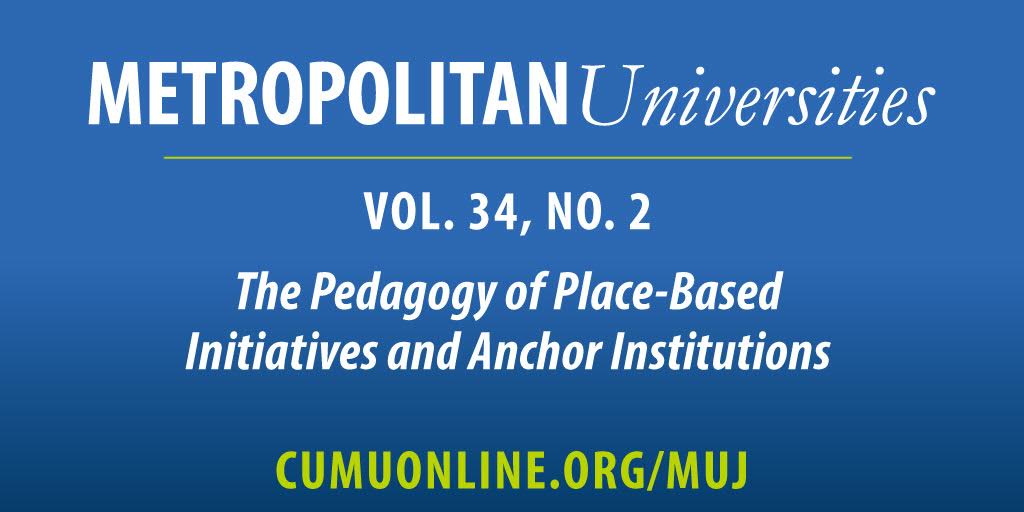Detroit as a Marker for Divorcing Place-Based Education and Orthodox History from Oppressive Pedagogy Practices
DOI:
https://doi.org/10.18060/26448Keywords:
place, place-based education, PBE, pedagogy, social studies pedagogy, history pedagogy, pedagogical theory, social theory and pedagogyAbstract
Most research and practice surrounding place-based education is focused in STEM-specific initiatives. This article takes a social theoretical approach to question that predominance, underscoring the role of STEM in bipartisan, nationalist narratives in the United States since the 1980s to suggest that place-based practice serves an oppressive function when instituted without corresponding place-based pedagogy in social studies. These potentially oppressive dynamics are argued to be acute in urban contexts in which orthodox, didactic pedagogical methods in social studies education promote complacence within an oppressive economic system. These orthodox methods are contextualized within the perspective of social theorists from Baudrillard to Fukuyama that history has increasingly been made to appear as a static procession as opposed to as a transformable process in which young people can participate. Using the author’s experience as a place-based educator in Detroit, the article charts a path for an orthodox but critical, place-based social studies curriculum for high school students in Detroit in which history is taught backwards through the context of the city and its history, a process that is replicable in other localities. It also charts an unorthodox, dynamic, dialogical social studies curriculum in Detroit---also replicable in other localities---for educators invested in place-based processes of knowledge production with young people. These processes utilize a deep place method in which the classroom and the dynamics therein are made a critical aspect of place.
References
Advanced Placement Access and Success: How do rural schools stack up (2017, August). Retrieved from https://www.ecs.org/wp-content/uploads/Advanced-Placement-Access-and-Success-How-do-rural-schools-stack-up.pdf
American Competitiveness Initiative. (2006, February 2). Retrieved from https://georgewbush-whitehouse.archives.gov/stateoftheunion/2006/aci/index.html
Baudrillard, J., & Turner, C. (1995). The Illusion of the End. Cambridge: Polity Press.
The Benefits of Place-based Education: A Report from the Place-based Education Evaluation Collaborative. (2010).
Block, F. L. (2018). Capitalism: The Future of an Illusion. Oakland, CA: University of California Press.
Bloom, B. S. (1984). Taxonomy of Educational Objectives: The Classification of Educational Goals. New York, NY: Longman.
Bowles, S., & Gintis, H. (1976). Schooling in Capitalist America: Educational Reform and the Contradictions of Economic Life. New York, NY: Basic Books.
Coles, G. (2018). Miseducating for the Global Economy: How Corporate Power Damages Education and Subverts Students' Futures. New York, NY: Monthly Review Press.
Cotton, Blackburn, Kustoff Unveil Bill to Restrict Chinese STEM Graduate Student Visas & Thousand Talents Participants. (2020, May 27). Retrieved from https://www.cotton.senate.gov/?p=press_release&id=1371
D'Augustino, T. (2018, October 03). Place-based Education Enhancing STEM Education.
https://www.canr.msu.edu/news/place_based_education_enhancing_stem_education
Dyer, K. D. S. (2021, August 17). Research proof points: Better student engagement improves student learning. Teach. Learn. Grow. Retrieved July 23, 2022, from https://www.nwea.org/blog/2015/research-proof-points-better-student-engagement-improves-student-learning/
Elfer, C. J. (2011). Place-Based Education: A Review of Historical Precedents in Theory & Practice.
A First Look: Key Data Highlights on Equity and Opportunity Gaps in Our Nation's Public Schools. (2016). Retrieved from https://www2.ed.gov/about/offices/list/ocr/docs/2013-14-first-look.pdf
Freire, P. (2012). Pedagogy of the Oppressed. New York, NY: Bloomsbury Academic.
Freire, P. (1970). Cultural Action for Freedom. http://thinkingtogether.org/rcream/archive/110/CulturalAction.pdf
Fukuyama, F. (1989). The End of History? The National Interest, (16), 3-18, http://www.jstor.org/stable/24027184
Fukuyama, F. (1992). The End of History and the Last Man. New York, NY: The Free Press.
Getting Smart. (2017, February, 9). What is Place-Based Education and Why Does it Matter? Retrieved from https://www.gettingsmart.com/2017/02/what-is-place-based-education/
Glasson, G. E. (2015, September). Place-Based STEM Education. Retrieved from https://innovate.cired.vt.edu/wp-content/uploads/2015/09/Glasson-Place-based-STEM-Education_020617-3.pdf
Graham, S. E., & Provost, L. E. (2012). Mathematics Achievement Gaps Between Suburban Students and Their Rural and Urban Peers Increase over time. Carsey Institute, (52). doi:10.34051/p/2020.172
Greenwood, D. A. (2003). The Best of Both Worlds: A Critical Pedagogy of Place. Educational Researcher, 32(4), 3-12. doi:10.3102/0013189x032004003
Greenwood, D. A., & Smith, G. A. (2008). Place-based Education in the Global Age: Local Diversity. New York: Routledge.
Handelsman, J., & Smith, M. (2016, February 11). STEM for All. Retrieved from https://obamawhitehouse.archives.gov/blog/2016/02/11/stem-all
How Place-based Science Education Strategies Can Support Equity for Students, Teachers, and Communities. (n.d.). Retrieved from http://stemteachingtools.org/assets/landscapes/STEM-Teaching-Tool-57-Place-Based-Science-Education.pdf
Jay, M., & Conklin, P. (2020). A People's History of Detroit. Durham, NC: Duke University Press.
Learning Science in Informal Environments: People, Places and Pursuits. (2009). Washington: The National Academic Press.
Logan, J. R., & Burdick-Will, J. (2017). School Segregation and Disparities in Urban, Suburban, and Rural Areas. The ANNALS of the American Academy of Political and Social Science, 674(1), 199-216. doi:10.1177/0002716217733936
Macedo, D. P. (2019). Literacies of Power: What Americans Are Not Allowed to Know. London: Routledge.
Morales-Doyle, D., & Gutstein, E. (2019). Racial Capitalism and STEM Education in Chicago Public Schools. Race Ethnicity and Education, 22(4), 525-544. doi:10.1080/13613324.2019.1592840
National Security Strategy. (2010, May 1). Retrieved from https://obamawhitehouse.archives.gov/sites/default/files/rss_viewer/national_security_strategy.pdf
Powers, A. L. (2004). An Evaluation of Four Place-Based Education Programs. The Journal of Environmental Education, 35(4), 17-32. doi:10.3200/joee.35.4.17-32
President Donald J. Trump is Working to Ensure All Americans Have Access to STEM Education. (2018, February/March). Retrieved from https://www.whitehouse.gov/briefings-statements/president-donald-j-trump-is-working-to-ensure-all-americans-have-access-to-stem-education/
Reinhold, R. (1982, May 13). Reagan Warns Schools are Failing to Meet Science and Math Needs. Retrieved from https://www.nytimes.com/1982/05/13/us/reagan-warns-schools-are-failing-to-meet-science-and-math-needs.html
School Climate and Safety: Data Highlights on School Climate and Safety in Our Nation's Public Schools. (2018). Retrieved from https://www2.ed.gov/about/offices/list/ocr/docs/school-climate-and-safety.pdf
Science, Technology, Engineering, and Math, including Computer Science. (n.d.). Retrieved from https://www.ed.gov/stem
Smith, M. S., Scoll, B. W., & Linj, J. (1996). Read "Improving America's Schools: The Role of Incentives" at NAP.edu. Retrieved from https://www.nap.edu/read/5143/chapter/3
Sobel, D. (2013). Place-based Education: Connecting Classrooms and Communities. Great Barrington, MA: Orion.
STEM in Early Education (SEE). (2016, December 13). Retrieved from https://manoa.hawaii.edu/crdg/research-development/research-programs/stem-in-elementary-education-see/
Tuck, E., & Yang, K. W. (2012). Decolonization is not a metaphor. Decolonization: Indigeneity, Education, & Society, 1(1), 1-40.
Wineburg, S. S. (2018). Why Learn History (When It's Already on Your Phone). Chicago ; London: The University of Chicago Press.
Zinn, H. (2017). A People's History of the United States. New York, NY: Harper.
Downloads
Published
Issue
Section
License
Copyright (c) 2023 Joshua Musicant

This work is licensed under a Creative Commons Attribution 4.0 International License.



